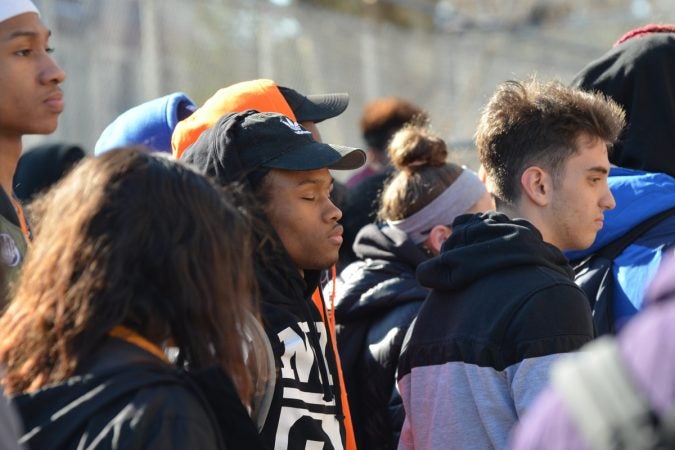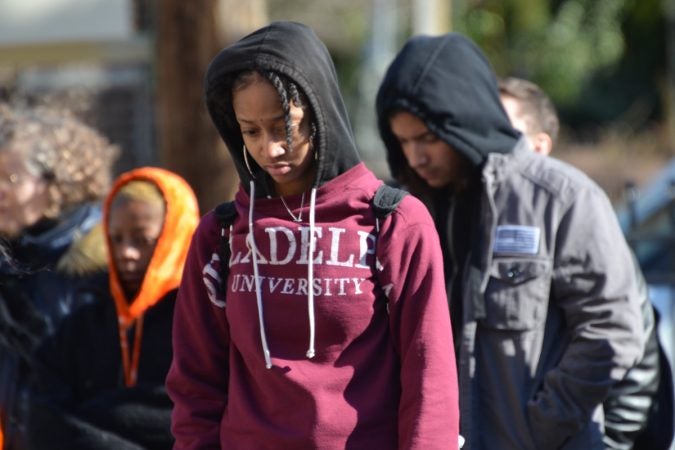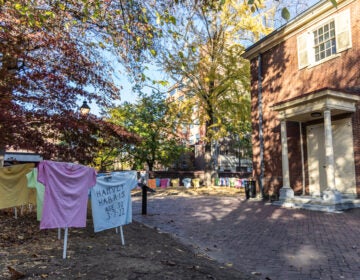Girard Academic Music student: Do not ignore the youngest of us in gun law debate
Adults are constantly telling our youth that ... not only does our opinion not matter, but we don’t have the capabilities to imprint a change.
-

Arshad White, a senior at Girard Academic Music Program, stands with his eyes closed during a moment of silence on March 14, 2018. "I was so emotional.," he said. "I was thinking a lot of things, but most of all I'd say I was trying my hardest to pay respect to the kids who died. I was more upset than anything else." (Nathania Santoso)
-

Emyne Sanders-Rasul, a senior at Girard Academic Music Program, said, "I was trying to connect with all of the people hurting that day. I was trying to feel that energy and resonate with it." (Nathania Santoso)
-

Students from Girard Academic Music Program in Philadelphia stand outside for 17 minutes of silence on March 14, 2018, in solidarity with the 17 students and faculty in parkland, Florida, who were killed a month prior. (Jerry Kalins)
The mass shooting at Marjory Stoneman Douglas High School in Parkland, Florida, was devastating — but not shocking. As horrible as it is, gun violence kills people constantly. This is America’s normal. The news was just another disappointment in America. But when the headlines about the mass shooting didn’t die down as they normally do, it became clear that this is an issue here to stay.
Just days after the shooting, talk of a nationwide student walkout to demand action against gun violence was the main buzz of the week. The Parkland students who organized to voice their opinions inspired not only me and my school, Girard Academic Music Program in South Philadelphia, but also students across the country. We are fed up with adults who have the chance to make a change but take no action to do so. As student body vice president, I wanted to promote the fight against gun violence within our school and take action for change.
While discussing the walkout, our executive board faced the question of whether we should include our middle school students. We had to take students as young as fifth grade into consideration. Should we allow 10-year-olds to walk out and protest? Are they mature enough? Are they too young to comprehend the issue? To me, all these questions were the same thing as asking if a 10-year-old’s opinion matters.
Adults are constantly telling our youth that we are too young to comprehend the issues in the world, that not only does our opinion not matter, but we don’t have the capabilities to imprint a change. But would you tell the kids in Sandy Hook that they’re too young to have an opinion on gun violence? It became clear to me and our executive board that including the middle school was more than important; it was vital. We spent days leading up to the walkout preparing and discussing it with our younger classmates.
On March 14, students of Girard Academic Music Program stood outside for 17 minutes in silence and solidarity. And after the 17 minutes ended, I walked to the first floor, where the student council dedicated its monthly bulletin boards to those who have lost their lives to gun violence. The board had pictures of the 17 victims from the Parkland shooting, as well as the 26 teens who have died in Philadelphia from gun violence since the school year started. We asked the students to write on the board “#enough” and to leave flowers in honor of the victims.
As I approached the bulletin board, I was stopped from coming near it — there was a sea of middle-schoolers crowding around it. They were taking turns writing on it, dropping off flowers, and comforting and supporting fellow classmates. Teachers approached me and informed me that the seventh- and eighth-graders initiated a die-in protest and read the names of the 17 victims during the walk out. (The middle school protested outside of the entrance opposite from the high school.)
I didn’t even know what a die-in protest was until I went home and googled it that day. They took initiative and came up with ideas that I didn’t even think of. We doubted their maturity and knowledge, but they showed us that they didn’t even need us to guide them.
As I stood there watching the young and resilient children of my school, I realized that this is our middle school. This is our generation — the generation that grew up in the age of social media. We are constantly being informed about the world around us. These kids are the future. In less than a decade, these same kids will be able to vote, and they are not oblivious of the issues of our nation. I began to understand that we can’t stop kids from voicing their opinion just because of their age.
We watched the students of Stoneman Douglas stand up, and now students all across the nation — no matter what age, race, gender, religious affiliation, or sexuality — are doing the same. We are known as Generation Z ー the kids who adults claim are attached to their phone and know nothing beyond it. But we are also the same kids who will make a change when the “adults” of this world aren’t willing to do so.
—
Claire Gunawan, 16, is vice president of the Girard Academic Music Program student body.
WHYY is your source for fact-based, in-depth journalism and information. As a nonprofit organization, we rely on financial support from readers like you. Please give today.




